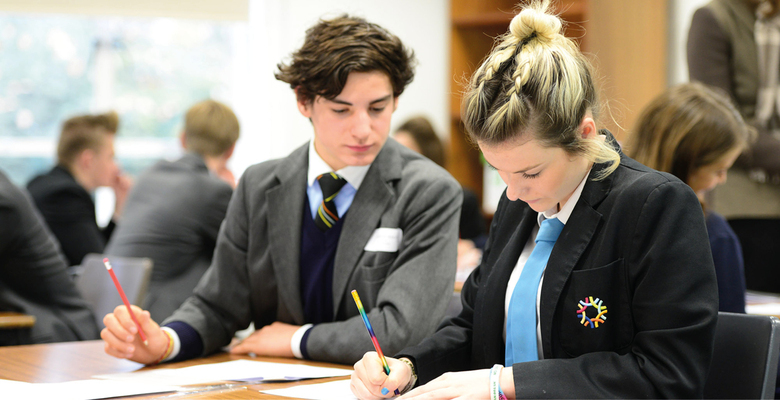
On August 28, secondary schools in England and Wales finally announced results in the all-important school leaving exams, the GCSEs. This year, for many, they were discouraging. 30% of students in England did not pass compulsory subjects, such as English and Maths, which is a fall of 5% on the previous year’s figure of 24.7%. These exams are crucial to further study. If your child has failed them, what should you do and to whom should you turn? And are the circumstances as dire as they first appear?
Julia Kolbasova, founder of Almanax London, education consultant
What should we do if a child hasn’t passed their Maths or English GCSEs?
First of all, you need to find out the reason why they didn’t pass. Maybe it’s because the child has only recently arrived in the country and still hasn’t had time to learn English or familiarise themselves with the syllabus. Four things are necessary to pass the exam successfully; first, they must know the language, second, they’ve got to know the material on the syllabus, third, they’ve got to have exam skills and be able to answer all the questions in the time, and fourthly, they’ve got to have a grasp of the marking scheme. For example, an exam may contain 16 questions, with two points awarded for the first question and 16 points for the final question. If the child doesn’t know how the paper is marked, they might start by writing a detailed answer to the question for two points and then not have the time to give a full answer to the question for 16 points. It’s important to investigate the reasons for the poor mark to understand what factors can and cannot be improved.
In England, there are two ways to find out how a child has passed an exam and to make sense of the mark they’ve received. The first is to request an exam review, where you can see what mistakes were made. The request must be made before 7 September 2023. The second way is to request a remark in the hope of getting a higher grade. This is possible if the original result is judged to be unfounded. This document must be requested before 28 September 2023. At this point, it’s important to understand the assessment system. If the results are more than three points short of a higher mark, you may consider ordering a remark for a fee but, typically, grades are only raised by a maximum of three points, so you have to decide if it’s worth taking the risk. If they’re more than ten points short, then it’s virtually useless to order a remark. Both these procedures can be ordered at the school, regardless of whether it’s a state school or private. You have to go to the Exam Officer, there is one in every school. To be on the safe side, I’d advise preparing to retake the exam whilst you’re waiting for the remark. Most often resits happen in the autumn. If the child is enrolled at a school, the simplest and most reliable way is to arrange the reexamination there. The date of the resit is published on the site of each separate admissions committee. Maths and English GCSEs are retaken the most often, so a schedule already exists for them. These exams can be resat at any examination centre. The details of these are listed on the site of the examination commission, or you can search for them online and choose the most convenient location. Of course, if the results are disappointing, children are advised to retake exams, and in my view, it’s essential.
Natalya Mosunova, PhD, adult education expert and creator of social skills development programmes

If a child hasn’t passed their Maths or English GCSEs, what doors does this close for them and how can this be put right?
It’s important to understand that this isn’t a failure. If the child who has received poor marks in their exams plans to continue their education, then they'll have to retake them shortly. The schedule is already set and the resits start in November. Generally, these subjects can still be retaken until the age of 18 and the new results will be accepted by educational establishments. What will happen if they don’t resit them? Apart from your disappointment as a parent, nothing untoward will occur. It’s always possible for them to continue their education with a focus on more functional skills. If they don’t want to resit their GCSEs, there’s quite a wide range of fields in which they can continue their studies, leading to professions, not all of which may be the most prestigious, but which are well-paid. If they’ve decided that they want to acquire practical knowledge and skills, they can start doing an apprenticeship straight away. In this case, they don’t need to resit their Maths or English GCSEs, as these subjects will be included in the study programme.
Will they be able to go to university later on?
Yes, because practical qualifications can be converted into those required for admittance onto higher education courses, although there may be limitations on the type of university or profession. There is provision, not without justification, for recognising an equivalence between final exams from functional skills courses and GCSEs (although no higher than GCSE). Also, each case is individual, so you can’t just assume outcomes based on what is statistically likely. However, hoping that a child who has failed their Maths GCSE or only got a 4 will pass the subject at A-level and be admitted to one of the top universities to study fundamental mathematics and medicine is, to put it mildly, not quite realistic. In this context, GCSEs are more of an opportunity for children to test their knowledge, find out what they’re good at and what they're not, and adjust their strategy for getting into university and their choice of future profession accordingly.
Are certain professions barred forever if the GCSE resits are foregone?
Some specialised professions become inaccessible, such as engineering, which is currently the most sought-after profession in Britain, with the shortage of qualified engineers in some sectors standing at 20 to 50%. Medicine, including nursing, will also be unattainable, as well as teaching. A teacher should get at least 4-6 in all GCSE subjects.
To sum up, I’d say that there is nothing disastrous about this situation. They need to take the results they have received and compare them with their plans and dreams for a future profession. If necessary, they should adjust these plans. Two years is quite enough time to do that.







